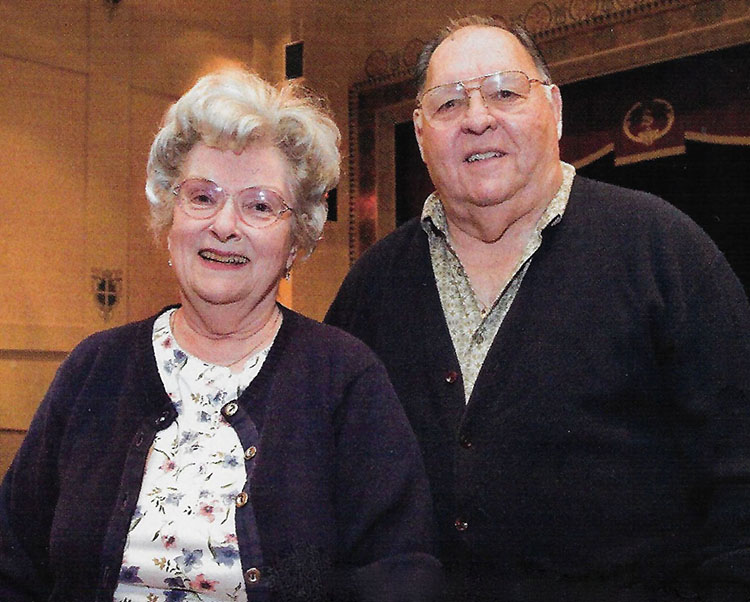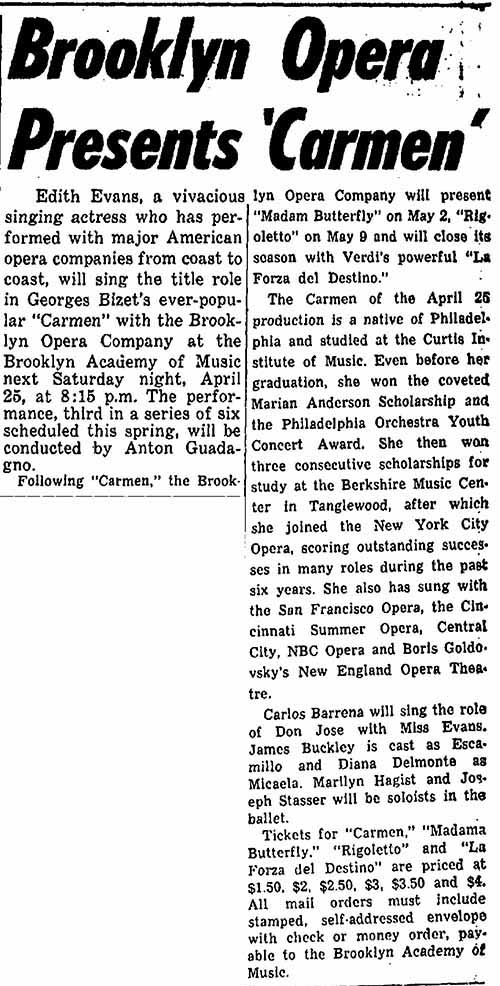|
 |
El Grupo Experimental de Ópera estrena en Cuba la obra IL TABARRO, de Puccini, en la sala del Casino Deportivo, La Habana. Esta obra, que originalmente integra el famoso Tríptico del compositor italiano, se representó en la capital cubana de manera independiente. Fueron sus primeros intérpretes Olga Valdés y Gladys Puig (Giorgetta); Mary Ellen de Cárdenas (Frúgola); Clara Nicola (Amante); Orlando Hernández y Ángel Menéndez (Michele); Carlos Barrena (Luigi); Francisco Solís y Hernando Chaviano (El Tinca); Fernando Labrada (El Talpa); Julio Castaño (El Vendedor de Canciones); Hernando Chaviano (Amante); Carlos Ruiz [de la Tejera] (Un Organillero); Olga Díaz Sampera y Clara Nicola (Las Niñas); Heri Echevarría y J. A. Montoto (Los Estibadores). Director artístico Paul Csonka. Puesta en escena de Eric Santamaría. Dirección musical Pura Ortiz. Concertador Enrique Beltrán. Escenografía Lacámara y Echevarría. Vestuario diseñado por Echevarría y ejecutado por D'Argas. Asistente de dirección Hermann Wilhelm. Coordinador general Hernando Chaviano.
April 1958, Il tabarro from www.liricocuba.cult.cu (defunct)

It was a twist of fate – an accident, as he calls it – that brought opera and Carlos Barrena to Fort Pierce nearly three decades ago [i. e. in the late 1970s].
Barrena was a professional opera singer with tours in the United States, Canada and Europe. When he had a chance to start a Spanish opera company in Miami, he went for it.
"It didn't work out," said Barrena, who retains a heavy Spanish accent from his native Cuba. "What it did was eat all my savings."
He turned to his second love, jai alai, to make a living. Barrena had been a professional player in his younger years, so when he was offered the job as assistant manager and chief referee of the Fort Pierce fronton, he and his wife, Carmen, made the move to the Treasure Coast. "It was an accident that I came here."
"I worked at jai alai, but I kept singing. They told me they would give me time off if I had concerts or whatever."
He performed the occasional out-of-town concert and word got around locally. Eugene Hartzell, who taught music at Indian River Community College, asked Barrena to meet with some of his adult vocal students. Soon Barrena was teaching Hartzell's students how to sing opera. The First Presbyterian Church in Fort Pierce invited him to sing a few numbers.
"After that they started calling me," Barrena said. "Everybody wanted to study."
Most of the dozen people who began studying with him were music teachers or church musicians. Then the students approached him about forming an opera company. "They were thinking Sunday social," Barrena recalled. "I said I wouldn't go for that. I told them we'd have workshops, and if we couldn't go professional in a year I'm out. I loved opera too much."
One of his students was Anne Abood, a 50-year-old piano teacher who knew surprisingly little about opera. Abood would often serve as Barrena's piano accompanist, but also took voice lessons from Barrena.
Opera changed Anne Abood's life in ways she never imagined. "Back then I was a small-town mother of four with piano students. This was a whole new world for me."
Her opera journey came out the same time she was dealing with her husband's illness and death from cancer.
"I really started not with an eye to performing it, but I thought it would help me as a voice teacher. Before I knew it, I was just so enchanted with it I just had to sing it."
The Treasure Coast Opera Society produced its first opera, La bohème, on December 8th, 1979, at the St. Lucie County Civic Center, with Barrena performing in the major tenor role. Abood wasn't in the program.
"He gave lessons to me for a year or two before he trusted me to go on stage," Abood said. "The first role I did was Adina in Elixir of Love, the major soprano role. Thereafter, I sang the lead soprano role in La bohème, Madame Butterfly, Carmen and Die Fledermaus."
Ever since, Barrena and Abood have been inextricably identified with the Treasure Coast Opera, so much so that some people mistakenly think they are married.
"We fight all the time," said Abood, a widow. "If we were married we would have killed each other years ago."
Barrena carries the title of general manager and artistic director of the opera. Abood used to be the president, but a few years ago relinquished the position. "I just prefer not to have a title," she said. "I'm just there."
From a small office in the Sunrise Shopping Center in Fort Pierce, Abood, 77, and Barrena, 79, run the 80-member Treasure Coast Opera Society. With its Spartan furnishings, boxes of props stored on industrial shelving, spinet and folding chairs lined in rows, the office looks more like it's ready for a Sunday rescue mission service than yet another season of Puccini and Verdi.
Abood and Barrena say keeping the society going is a constant struggle. In the early years, the society was helped with support from the Leonhardt Foundation and an annual donation of a painting by landscape painter A. E. "Bean" Backus that was auctioned off. Today, the society receives much of its support from patron Richard Stark of Vero Beach, the city of Fort Pierce, various other contributors and ticket sales to meet its $ 250,000 annual budget.
"It's an adventure," Barrena said. "Every year we think it's the last year – that we won't have enough funding – but we somehow complete the season."
The society usually performs three operas a season, and this year will be no different. Productions planned are Puccini's La bohème on January 20th, Romberg's The student prince on February 18th and Verdi's La traviata on March 31st.
Barrena quit performing in Treasure Coast Opera productions in 1994. Abood still accompanies chorus rehearsals. Professionals play the lead roles and the American Festival Symphony of South Florida provides the orchestral accompaniment. The only resident singers are the chorus members. "Some have been with us almost since the beginning," Abood said. "You could almost call them professional singers they've sung these operas so many times."
After 21 years at the Civic Center, which was razed earlier this year, the Opera Society moved this year to the Sunrise Theatre, which reopened in January after a $ 13 million renovation and 23 years of being closed. After hurricanes destroyed the Civic Center, the 2004-2005 season operas were performed in Vero Beach and Lincoln Park Academy in Fort Pierce.
"The Civic Center was a big barn, although it had a big stage," Barrena said. "We worked real hard with it, but it was not a legitimate theater. It was difficult to perform there. The Sunrise is a big improvement for us."
Abood said attendance at the operas usually numbers about 1,000. She and Barrena hope the new venue will bring attendance to about 1,200.
Off-season, the Treasure Coast Opera Society had produced American musicals, including Showboat, Kismet, South Pacific, Oklahoma and The music man during the summer. But budget constraints have kept it from producing any in recent years.
The society also provides educational programs for various school groups. On November 9th, more than 2,000 children packed the Sunrise during two separate shows to hear various numbers performed by opera singers the society had brought in. The performances prompted a flood of letters to the society from the children attending. "It's simply amazing how much they were able to perceive, discern voices and know one character from another," Abood said.
But it's not just children Barrena and Abood try to teach to love opera. They readily reach out to any adult who wants to know the key to understanding opera. Abood has a simple theory about that.
"The first thing you have to do is to sit down and commit yourself to hearing opera. Each opera is a world of its own. The
stories differ, the voice ranges differ, the demands on the singers are different. If you go to an opera and you don't like it,
keep going until you find one that suits your taste. Because, believe me, there's something for everyone."
Reference and picture source: Indian River Magazine, 2007
Barrena and Abood continued to run the Treasure Coast Opera for many more years. Their enterprise only closed for good after the 2010 season.
| Carlos Barrena sings Aida: | O terra, addio, with Licia Albanese |
I would like to thank Daniele Godor for the recording and links.